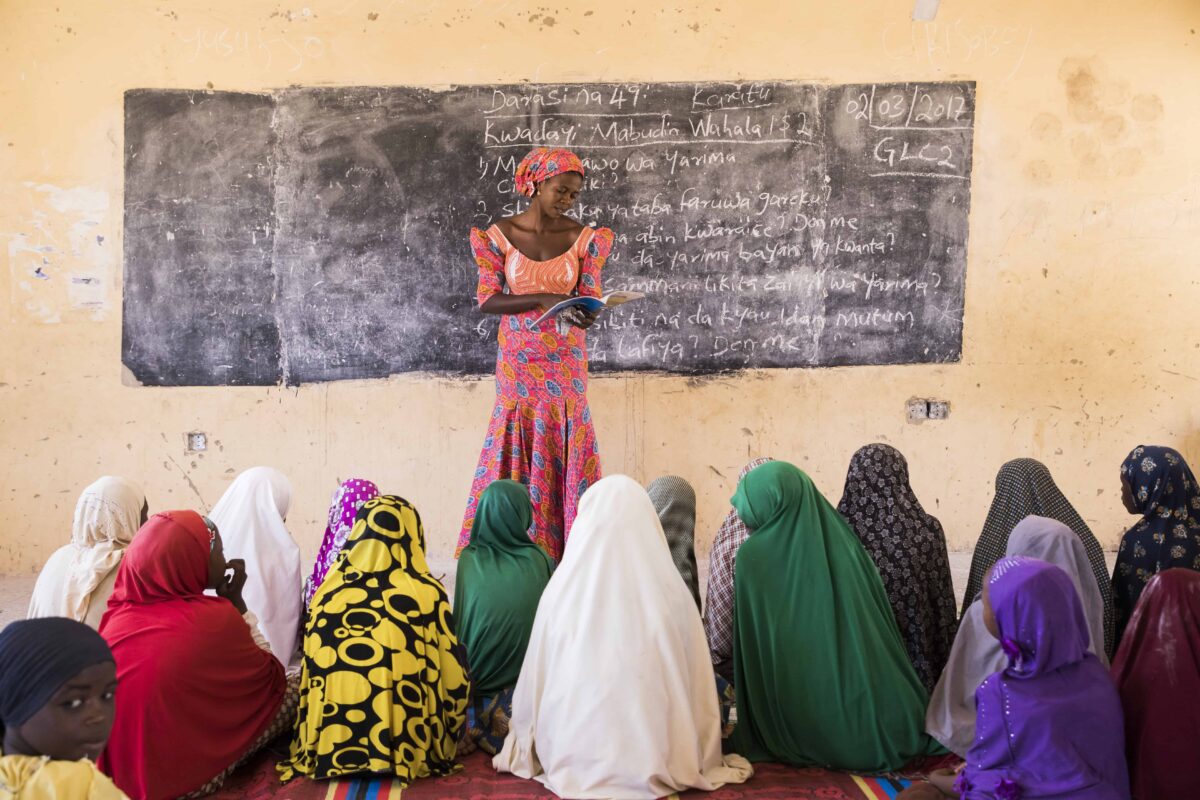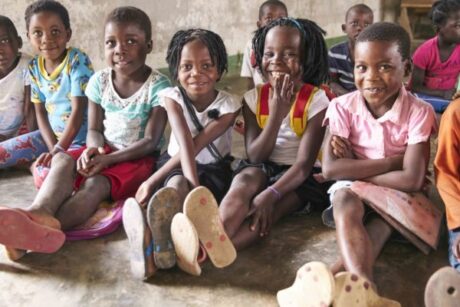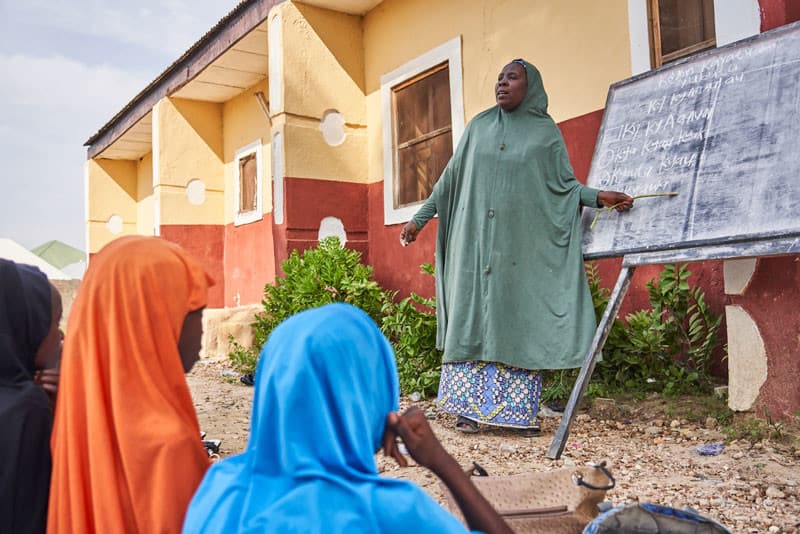Students who fail to acquire basic reading skills by third grade are more likely to fall behind, fail or drop out of school. Experts say poverty, underqualified teachers, language challenges and lack of access to textbooks keep children from receiving a quality education.
“Early grade reading lays the foundation for continuous learning, future schooling, employment and overall economic success,” disse Creative Associates International's Karen Tietjen, Diretor de Sistemas Instrucionais e Governança, no Sociedade de Educação Comparada e Internacional (CIA) conferência em março 29.
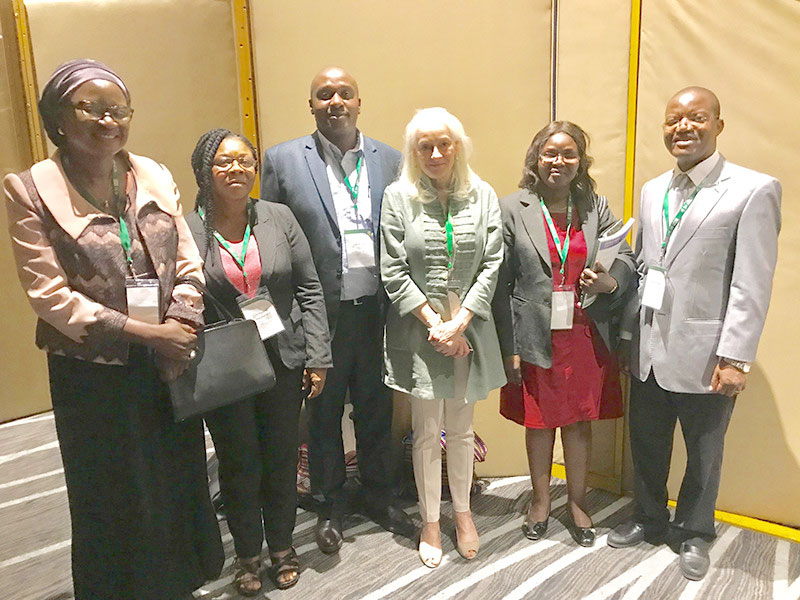
On the panel session called “Rolling-out and Scaling-up: The Insiders’ View of Reading Reform,” Ministry of Education representatives from Senegal, Nigéria, Mozambique and Kenya took up the topic of national early grade reading reform in their countries.
After student assessments revealed a literacy crisis in their countries, the ministries of education partnered with the global development community to improve learning outcomes.
The panelists said early grade reading reform must look at curriculum development, teacher training and professional development, textbook printing and delivery, among other key aspects of a robust educational system. This will be most successful when reforms are spearheaded by local ministries of education, said Tietjen, who chaired the interactive panel discussion.
“No final do dia, it is up to the individual ministries of education to make sure a reading reform program is implanted, accepted, developed and rolled-out throughout the country,"ela disse. “Trying to change a whole way of thinking and ensuring commitment to reading reform can be daunting.”
Apesar dos desafios, early grade reading programs in many African countries “are picking up the pace and education decision makers are taking hard questions head on,”disse Tietjen.
“They have vision, support and the tools for change,”ela acrescentou.
Panelists illustrated the reform process through case studies, including Northern Nigeria and Mozambique, explained below.
Curriculum: Getting to the heart of reading reform in Northern Nigeria
Nigeria has one of the highest numbers of out-of-school children in the world. It is also home to diverse populations and languages and ongoing conflict, including the Boko Haram insurgency in the northern parts of the country.
“In Nigeria, there are more than 500 idiomas, which is a big challenge in our education system – especially in choosing which language to use in the classroom," disse Margaret Lawani, Doutorado., Director of the Language Center at the Conselho Nigeriano de Pesquisa e Desenvolvimento Educacional. “Effects of the Boko Haram Insurgency and poverty add to learning barriers and keep children out of the classroom.”
Highlighting an education project called the Iniciativa de Educação do Norte Plus, Lawani said the project uses the local language of Hausa, which is the “language of the environment” to boost learning outcomes. She outlined the education project’s reading reform strategy by ensuring government and community commitment to quality early grade reading learning and teaching materials, as well as equipping teachers to use the curriculum.
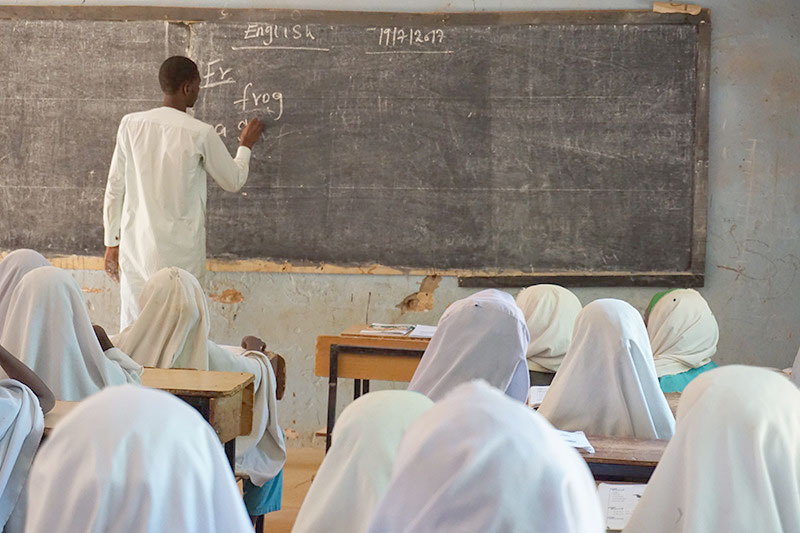
Financiado pelo NÓS. Agência para o Desenvolvimento Internacional, the Nigerian government-led project is being implemented in formal and non-formal schools in the country’s Sokoto and Bauchi states, com o objetivo de melhorar as habilidades de leitura por mais de 2 milhões de alunos do ensino fundamental. It is led by Creative Associates International, em estreita parceria com Centro de Desenvolvimento Educacional, Universidade Estadual da Flórida and Overseas Strategic Consulting.
The project works hand-in-hand with the Ministry of Education to implement a Hausa early grade reading program for first to third grades called Vamos ler, with a transition to English in fourth grade called Let’s Read!.
Learning materials are provided free of charge, ensuring every student has access to quality education regardless of their circumstance.
“Many parents in Bauchi and Sokoto can’t afford to pay for learning materials,” explained Lawani. “The Northern Education Initiative Plus project has distributed the Vamos ler books free of charge and literacy issues are being addressed.”
Along with the mother tongue learning and teaching materials, the project works with government counterparts to improve planning, orçamento, governação, transparency and accountability and to mobilize community involvement in ensuring their children gain reading skills.
Lawani said that this community collaboration and ownership of reading reforms by federal, state and local government education officials is a critical factor in strengthening education systems, especially in a conflict and crisis-affected, multilingual environment like this.
Rethinking ineffective reading policies: A look at bilingual education in Mozambique
Home to more than 20 idiomas, bilingual education is not a new phenomenon in Mozambique.
De 1993 para 1997, Mozambique’s National Institute for Education Development implemented the first-ever rollout of bilingual early grade reading reform in the country.
But since then, Mozambique has lacked a coordinated policy approach for both Portuguese and local language instruction, disse Armindo Ngunga, Ph.D., Vice-Ministro do Ministério da Educação e Desenvolvimento Humano de Moçambique.
And despite the introduction of mother tongue language in the classroom, learning gains haven’t proved to be sustainable.
Na verdade, Mozambique faces one of the highest illiteracy rates in the Southern and East Africa regions. A recent early grade reading assessment found that more than 90 percent of second graders in two northern provinces of Nampula and Zambézia could not read two words in Portuguese, a língua nacional.
"Hoje, there are serious literacy challenges in Mozambique,”disse Relógio. “We learned that kids are going to school but they aren’t learning.”
One reason for the poor performance is the difficulty in making the case for mother tongue or multilingual education, ele explicou.
“There are challenges in convincing decision makers who speak Portuguese and don’t speak mother tongue languages to prioritize multilingual education,”disse Relógio.
Como resultado, schools have gaps in resources like mother tongue learning materials, and teachers aren’t trained to effectively teach in multilingual environments.
Working alongside the Government of Mozambique to fill this learning and teaching gap, the five-year early grade literacy program called Vamos ler (Vamos Ler! em português) is building a bilingual education framework for national expansion. It aims to improve reading and writing skills for more than 800,000 estudantes em 2,800 escolas.
O programa é financiado pelo NÓS. Agência para o Desenvolvimento Internacional, e implementado pela Creative Associates International, em estreita parceria comEducação Mundial, Inc.., Consultoria Estratégica no Exterior, Institutos Americanos de Pesquisa eGrupo BlueTree.
Ngunga emphasized that in order to achieve the goal of boosting literacy in the languages children hear, speak and read at home, the program needs close collaboration and strong partnerships with and among government stakeholders. He added that this reform could have larger benefits for the country, beyond education.
“Mozambique fought for its independence and won,” said Ngunga. “We have realized that we will not achieve economic independence without first achieving intellectual independence.”
Frequentando o CIES?
Para visitar o CIES da Creative 2018 Centro de relatórios especiais, Clique aqui. Para uma programação completa do CIES da Creative 2018 painéis, incluindo painelistas, horários e locais, Clique aqui. Além das sessões de painel, pare no estande 54 para interagir com especialistas em educação e saber mais sobre os projetos globais da Creative. Siga-nos no Twitter @1977Criativo para atualizações ao vivo.
